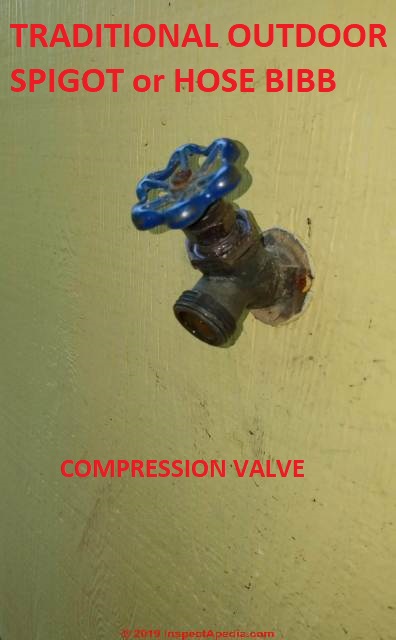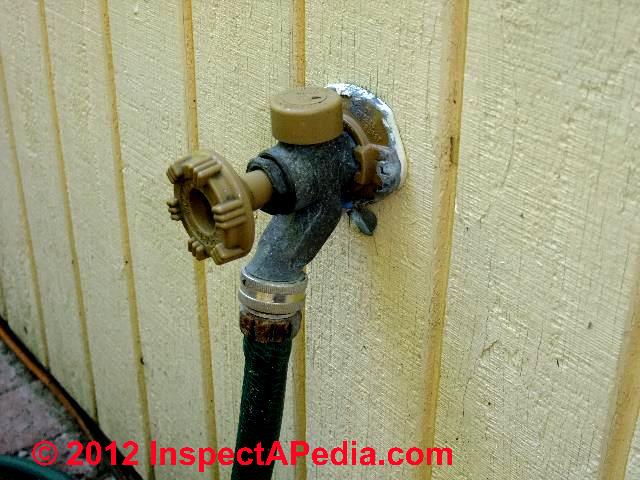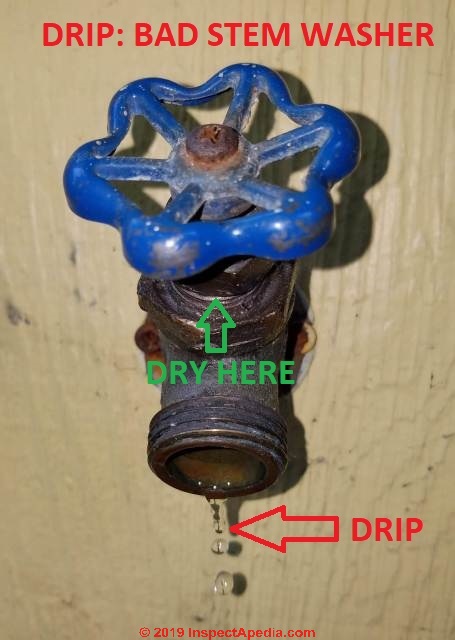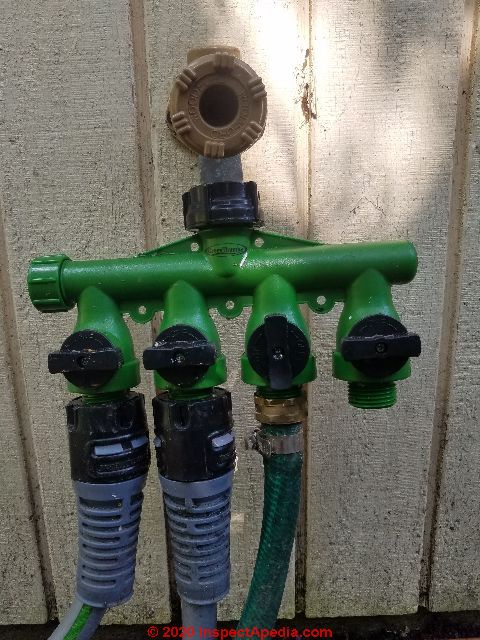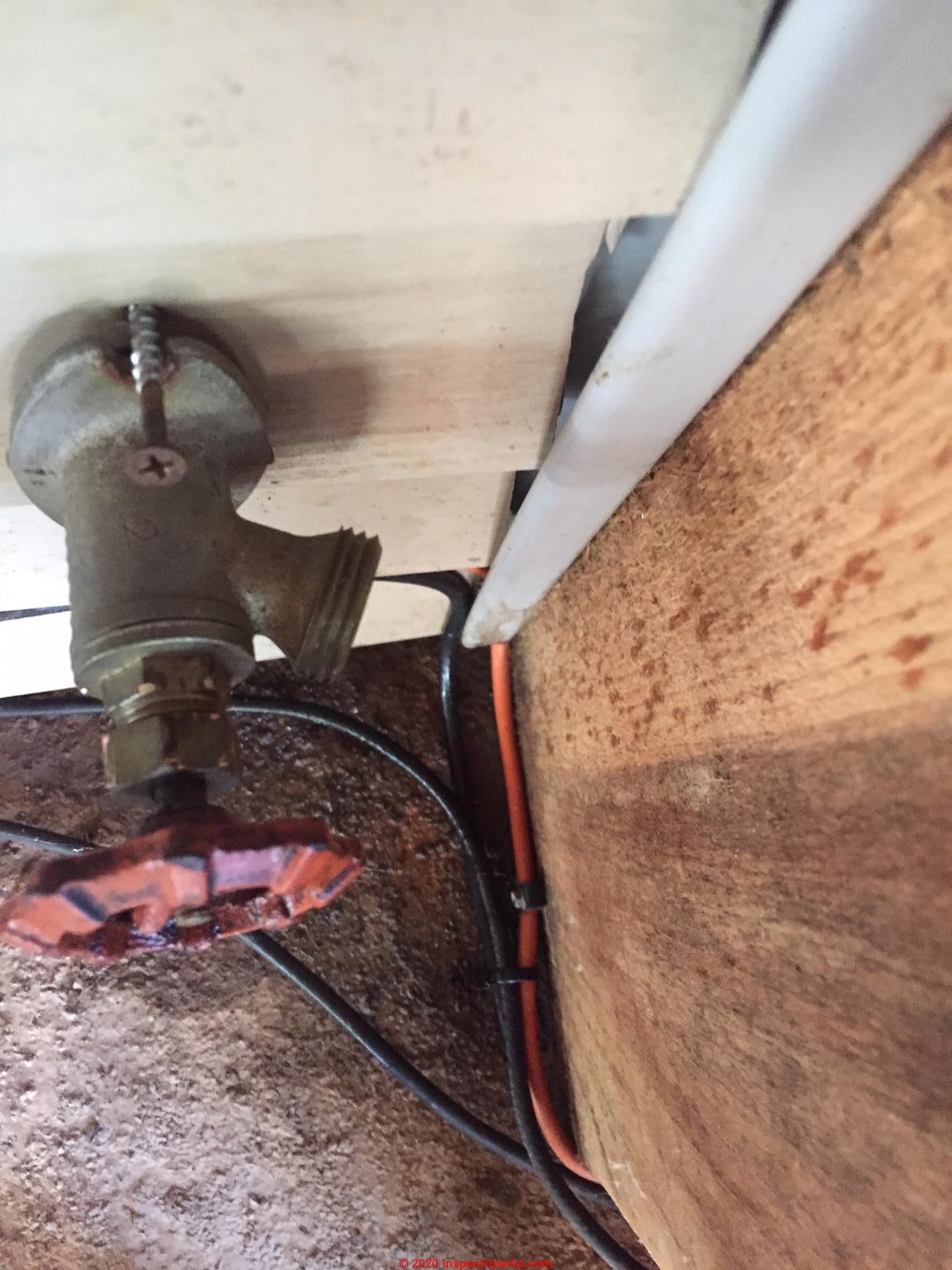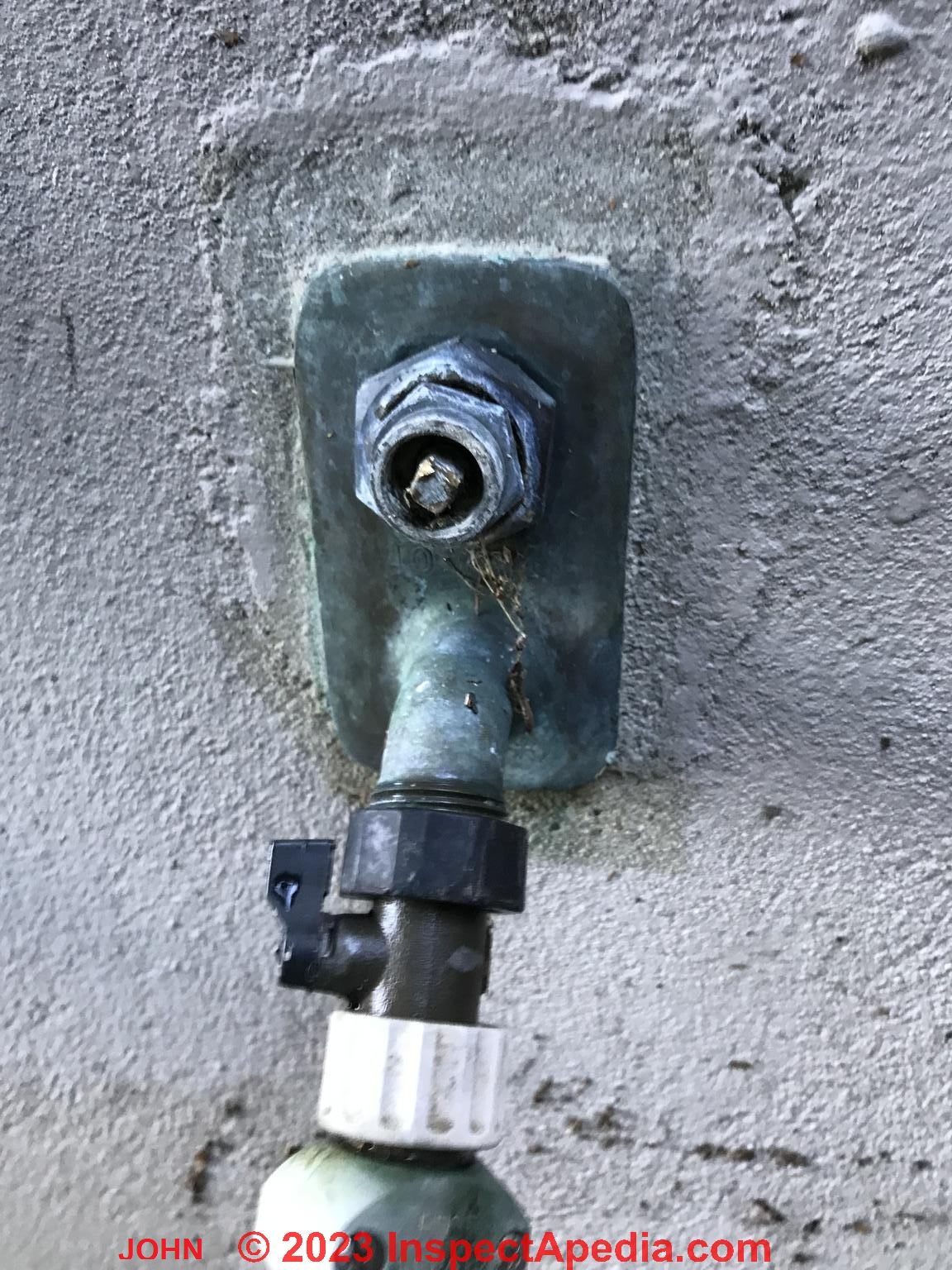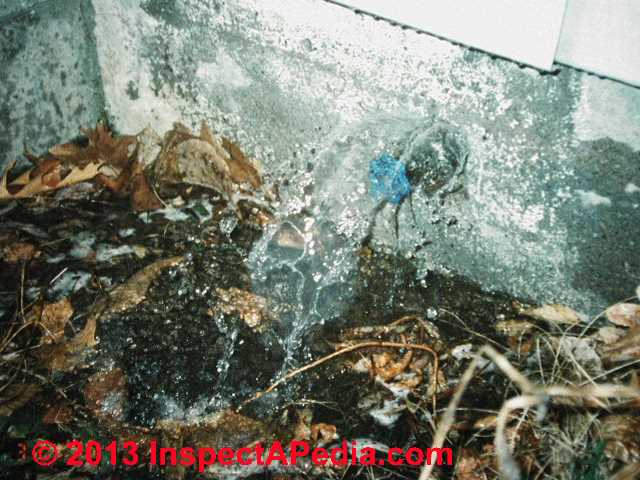 Faucets, Sill-cocks, Hose Bibbs & hose hook-up Repair
Faucets, Sill-cocks, Hose Bibbs & hose hook-up Repair
Outdoor plumbing, faucets, pipes, installation, repairs
- POST a QUESTION or COMMENT about outdoor wall faucets, sillcocks, hose bibbs, and freezeproof or frostproof faucets or faucet troubleshooting
Outdoor faucets, hose bibbs, & outdoor hose connections:
This article describes outdoor faucets, hose bibbs, sillcocks, or hose hookups, how they work, where they should be installed, freeze-proofing hose hookups, and troubleshooting or repairing stuck, broken, or dripping outdoor faucets.
We describe the component parts of outdoor faucets, how water flows through the faucet, and where drips or leaks occur. Leaky outdoor faucet repair instructions address each of these faucet leak locations & types and suggest a repair sequence from easiest that may work to more challenging faucet repairs that may be necessary.
Our photo at page top shows water gushing out of the building wall just above the foundation. The water line just inside the foundation froze and burst, then thawed and flooded the basement through the foundation wall.
InspectAPedia tolerates no conflicts of interest. We have no relationship with advertisers, products, or services discussed at this website.
- Daniel Friedman, Publisher/Editor/Author - See WHO ARE WE?
Outdoor Plumbing & Faucets: Prevent or Fix Leaks
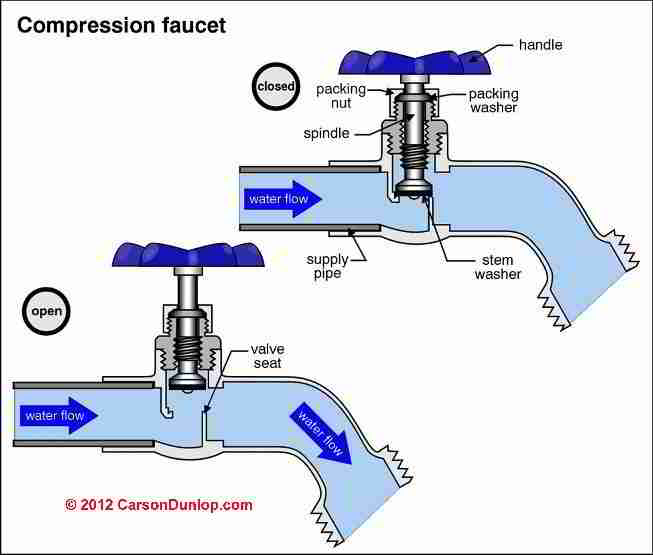 This article series describes how to repair leaks at outdoor faucets, or spigots or as some fancy inspectors call them, "hose bibbs" or "sillcocks".
This article series describes how to repair leaks at outdoor faucets, or spigots or as some fancy inspectors call them, "hose bibbs" or "sillcocks".
We describe different types of spigots including newer, code-required anti-siphon sillcocks, then we describe step by step repairs for each type of leak that occurs at these spigots:
- IDENTIFY FAUCET TYPE: repair procedures vary by kind of hose bibb or faucet you've got
- TEMPORARY FIX: FAUCET LEAK / DRIP - emergency or temporary ways to shut off a dripping hose faucet
- QUICK FIX: FAUCET LEAK at VALVE STEM - Traditional compression type faucets that leak around the faucet valve shaft - repairable either by simple tightening of the packing nut
- QUICK FLUSH OUT of DIRTY HOSE BIBB
- FIX a HOSE BIBB TOO CLOSE to AN OBSTRUCTION - too close to ground or too close to a wall to hook up a hose
- OTHER FAUCET REPAIRS - links to detailed procedures to replace a faucet washer, repair a leaky frost-proof or anti-siphon faucet, and more
Sketches of faucet parts and operation shown above and below are provided by Carson Dunlop Associates, a Toronto home inspection, report writing tool, and education company.
As you can see in the sketch above, opening the faucet allows water to flow from the pipe up through a passage cast into the body of the faucet and out the faucet mouth.
When this type of faucet is closed, the stem washer presses against the faces of the valve seat to stop water flow.
Below we continue by describing each of the first three types of leaks at conventional or "Old-Fashioned" outdoor spigots. We explain the cause of and repair for each of those leaks.
But first let's be sure we know what kind of outdoor spigot is installed, since the parts and repair procedures are different depending on what kind of faucet you've got.
...
What Kind of Faucet Have I Got?
If your outdoor faucet looks like our first photo at above, and if needs repair, it is NOT a frost-proof anti-siphon valve, it's a traditional compression valve faucet or spigot.
Some quick fixes for drips or leaks at this faucet are below on this page.
Detailed repair procedures for this type of faucet are
at FAUCET, OUTDOOR HOSE BIBB LEAK REPAIR
Below: a frost-proof anti-siphon outdoor hose bibb or spigot.
Our photo above is a typical frost-free anti-siphon faucet, or "Woodford" valve.
Repairing that faucet is discussed separately
...
Quick Fix for Traditional Leaky Hose Bibbs in Non-freezing Climates - Compression Faucets
Traditional compression faucets (shown above) allow water to flow from the building supply piping out through the faucet mouth by opening (turning) the valve handle counter-clockwise (to the left when looking at the top or face of the handle).
This faucet, when mounted on the wall of a building in freezing climates, is not protected from frost damage and can freeze, break, and subsequently leak when freezing conditions warm up.
If you live in a freezing-climate and if your outdoor faucet is the older type that is not frost-proof (photo at left), you should be able to turn off water to that faucet and open a small screw fitting on the faucet body side to assist in draining that device when draining the building piping.
For the hose bibb shown above, we found a water shut-off inside the building close to this device.
This hose bibb was also leaking - a slow drip
By installing the duplex hose splitter with two small black valve controls we could use that device to stop the drip - a temporary repair.
The right repair for a drippy faucet, as we will show below, is to replace the stem washer and if necessary, grind smooth the valve stem seat.
Watch out: notice that hose splitter attached to the sillcock at left? If those little black valves are left in the "closed" position in winter the faucet won't drain even when shut-off inside, and it may freeze and break.
Even in a building where heat and water are being left on for the winter we make sure to find and use (or install if needed) the valve to turn off water to each outdoor faucet.
Then we open the faucet to let it drain, leaving it open (and making sure it's not dripping from an indoor shutoff valve that is not working well).
Watch out: Never leave a garden hose attached to your outdoor faucet in winter as water in the hose may add to the risk that the faucet will be freeze damaged.
...
Quick Fix for a Leaky Outdoor Faucet At the Valve Stem
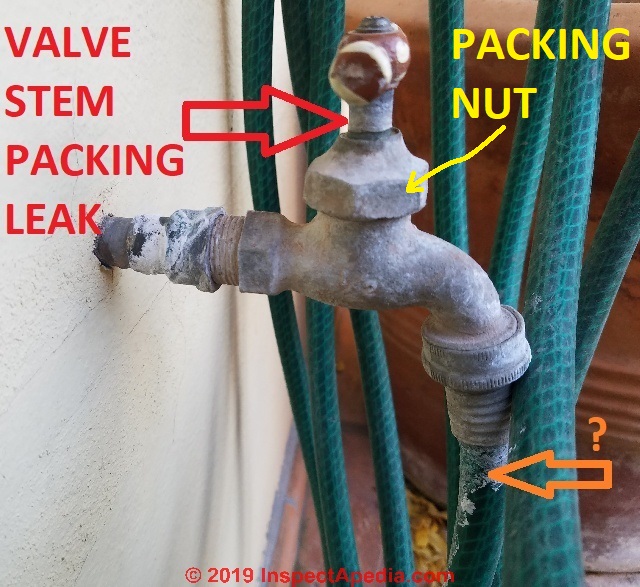 How to Repair a faucet that leaks around the valve stem when the faucet is turned on
How to Repair a faucet that leaks around the valve stem when the faucet is turned on
Leaks at an outdoor hose bibb or frost-proof faucet range from a drip to water gushing out of the faucet or out of the anti-siphon vent such as the leaky faucet shown in our photo at the top of this page.
The repair of a dripping hose bibb of this type depends on where the leak is occurring.
In our photo of a hose bibb or faucet in San Miguel de Allende the smaller orange arrow (lower right) shows white deposits on the garden hose below the faucet mouth: those may be due to leaks at the valve stem or leaks at the connection of the garden hose to the faucet mouth.
But the corrosion on the valve stem tells the story.
The larger red arrow points to white mineral deposits around the valve stem - telling us that whenever it was turned on this spigot has leaked for some time, probably years.
How to Fix a Leak at the Faucet Valve Stem
This common leak can usually be fixed by gently tightening the large packing nut (yellow arrow in our photo - also see Carson Dunlop's sketch below).
Tightening the packing nut (yellow arrow) by turning it clockwise may further compress the packing washer to cause it to squeeze more tightly around the valve stem and stopping the leak.
Watch out: do not so over-tighten the packing nut on the faucet that you cause it to crack or break, or it's new faucet time. Try just turning it 1/4 turn, then open the faucet again to see if the leak has been repaired. Tighten in small increments.
Don't tighten more than necessary or you'll find that the faucet handle becomes very difficult to turn.
If tightening the faucet packing nut does not stop the leak around the valve stem you can often repair this component easily.
Those details are
at REPLACE FAUCET VALVE STEM BONNET PACKING - to fix leaks around the valve stem, replace the dome packing
...
Quick Flush-Out of Dirt in Hose Bibb
 Reader question: First Thank you for all your wonderful help a couple of years ago with my well and septic tank issues.
Reader question: First Thank you for all your wonderful help a couple of years ago with my well and septic tank issues.
All fixed now. Do you have any diagrams of what the INSIDE of an outdoor faucet (attached to the house) looks like.
I have one that is essentially never used except at the water supply for my swamp cooler in the summer. I am sure it is plugged with mud from all the times the well has been pulled out of the ground over the years and it now seems to be bad enough to be affecting the flow to the cooler.
If I knew what the inside looked like I could at least try to unclog it a little at a time. I am told that because it is almost as old as the house (39yr) that it could break if I tried to remove it to replace it.
I have tried pipe cleaners, wire, water pressure (syringe with Christmas tree adapter), all with no luck. If I just knew what it looked like inside I like to think it would help. Thanks, - S.F.
Moderator Reply:
Thanks for the nice note. We are always very happy when our information proves useful, and thus much welcome questions & content suggestions such as your own.
Because you live in an area where swamp coolers are used, I infer that you're not in a freezing-climate and that your hose faucet is a simple one such as we show above.
Provided you are talking really about an outdoor faucet or hose bibb, (not a water flow control valve installed in a section of water piping) the illustration provided earlier on this page and reproduced at above-left shows what a warm-climate standard hose faucet looks like.
You can see from the cross sectional drawing that the bottom of the feed-pipe and faucet body could indeed accumulate mud and crud, leading to a clog that prevents water flow even when the faucet is "opened".
A simple fix for a debris-clogged faucet that usually works, though it sprays water all over the place (so is only suitable for outdoor repairs) is as follows:
- Loosen the faucet packing nut
to expose the (usually but not always present) smaller nut below the packing nut that secures the stem assembly to the faucet body. You may have to remove the faucet handle to be able to un-screw the packing nut and smaller stem nut completely. - Turn the faucet towards its "open" position
(you may have to put the faucet handle back on to do this) which will now unscrew the faucet stem assembly from the valve body.
This will give a view into the faucet interior body. If you see mud and crud therein, stand back, and turn on the building water supply to this faucet.
The water should push the mud/crud right out of the faucet assembly
and should flush it clean. If not you may need to pick at the internals of the faucet body to loosen hard-packed mud/crud.
Watch out: don't scratch up the valve seat face with a digging tool or the faucet may drip on reassembly.
Before reassembling the faucet, we recommend
- Install a new faucet stem washer and screw
- A dab of non-hardening teflon paste on the stem washer screw and on all other threaded parts.
...
How to Redirect an Outdoor Spigot that is Too Low or Too Close to an Obstruction
 How to raise up a hose spigot that is too close to the ground
How to raise up a hose spigot that is too close to the ground
Reader Question: I got a spigot like ground level. Is there things i can do to raise it higher. Besides running a new line. On 2020-04-06 by Mark
Reply by (mod) -
Mark:
How to raise a hose spigot or faucet or "hose bibb" that is too close to the ground
Take a look at my answer to Thom, below, where I illustrate hose bibb attachments that make a 90 or 45 degree bend. You can certainly connect a couple of these to point to the left, then up, then out to construct a hose connection point that is higher on the building wall.
For example, where we needed to attach a sprinkler system timer to a building in New York I used a short section of flexible hose that connected the hose bibb to a point higher on the building wall from which we had room to connect the sprinkler timer assembly.
For a semi-permanent hose bibb extender that gets the hose connection higher above ground level, use a short section of garden hose to connect the existing hose bibb to the extender I illustrate just below, then affix that extender to your building wall a bit off to one side of the existing hose bibb.
The vertical hose bibb extender (Yard Butler IHBE-6 Steel Hose Bib Extender) I show is sold by garden supply outlets for about $30. U.S.
You leave the lower hose spigot ON and turn water on and off at the extender.
Watch out: I would not leave this arrangement on at the original spigot (hose bibb) if going away from the building for any extended period.
With water left "on" at the source hose bibb, if the extension hose between the source bibb and the extension bibb were to burst, water would be left running indefinitely, wasting water and possibly causing local water damage.
In a still more complex and fancier design, if your water source is a local water pump, there are some pumps such as our The Grundfos SCALA2 pressure pump described
at WATER PUMP VARIABLE FREQUENCY / VARIABLE SPEED DRIVE (VFDs) that are so smart that the pump can detect when water is running in a manner that there is a leak somewhere - that pump will then shut down automagically.
OK to use a splitter for exterior spigot to run water into garage?
Can I run a splitter of some sort fro my exterior spigot line into my garage? I need to run a line to an on-demand single- point water heater. On 2020-02-10 by Anonymous
Reply by (mod) -
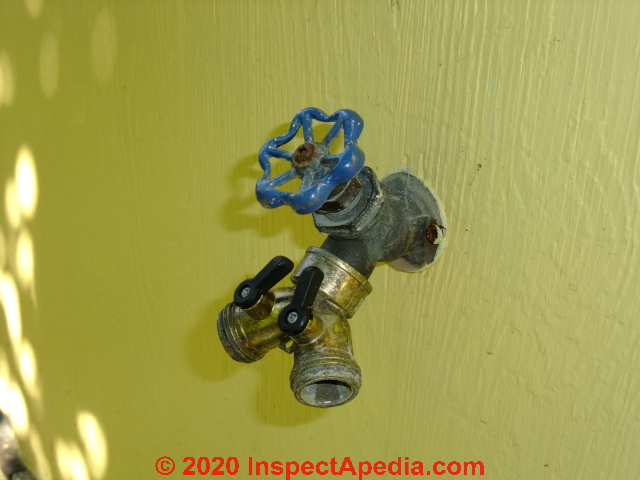 Anon
Anon
Thank you for an interesting question.
Certainly, there are splitting devices basically a y-shaped add-on that will allow you to connect to hoses to hose bib. In fact, there are connectors that will connect many more hoses than that.
However, there are a couple of reasons why I wouldn't consider feeding a water heater. From a hose connection.
First I don't ever want to run permanent Plumbing using a flexible garden hose.
Leaving the hose under pressure at all times as would be necessary in this case risks a burst hose and flood.
Worse if it happens when you're away from home.
If you live in a freezing climate, you would not want to feed your water heater from a split off of your hose bib because of the risk that that line could freeze in winter.
Below I show a multi-hose splitter that offers more possibilities. We used this splitter to supply multiple automatic lawn sprinklers.
How to fix a spigot that faces a wall - too close to use
I have a spigot that is facing a post and is not useful. How can i reverse the spigot so that will of use to me?
My spigot is facing a post and there is no room to attach a hose. How can flip the spigot to face away from the post so a hose can be attached to the spigot for use?
- On 2019-09-29 by tpetty58 -
Reply by (mod) - how to flip or redirect a spigot or sillcock that is blocked
Thom:
You can buy a hose bibb or spigot attachment that gives you a 90 degree elbow, or a 45 degree elbow that can be installed with the hose attachment point facing out away from the building.Below is an example: Camco 90 Degree Hose Elbow- Eliminates Stress Strain On RV Water Intake Hose Fittings, Solid Brass (22505)
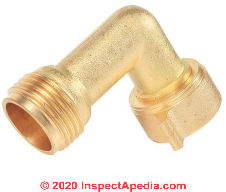
...
Outdoor Plumbing to Resist Saltwater, Corrosion, Freezing
What faucet type & pipe material do you recommend to resist salt water & freezing?
Re-posted by moderator:
Outdoor Shower Pipe and Valves
Is copper pipe the best option for an exterior mounted outdoor shower or can I use solid brass pipe with a chrome finish or even 316 stainless pipe?
Will a faucet that has ceramic cartridges give me problems in the winter?
The system will be drained before first frost.
I would rather not have to remove and then reinstall the cartridges each season (I know it’s not a big deal but there are other factors at play).
I was able to get a Speakman Commander SC1240-LH exterior mounted shower setup.
My main worry is that while this shower/faucet looks great, am I better off with a copper pipe simple setup like what is in place.
Please see below for more context and details on site conditions and history.
I am in the process of replacing the outdoor shower at my families home by the ocean. The entire system is externally mounted on the exterior wall of the house. The entire shower and supply lines are constructed of 1/2” copper pipe. The hot and cold simply have a valve right before a T fitting that then goes up to a drop elbow.
The current shower has been in service for around 40 years. That said we have to replace sections on it every 5 to ten years. This is due to the high salt content and extreme humidity and the fact that temperatures in the summer reach 100plus F and get well below freezing in the winter (the shower is drained before frost date)
My plan is to sweat threaded ends onto the copper supply lines on the side of the house and then use solid brass (chrome plated) or stainless pipe and the Speakman faucet for the last (shower) section.
Sorry for the length of this and I would greatly appreciate any help or advice.
Happy to provide an email address if that helps.
This is by far the best, most comprehensive and interesting resource I have found.
Thanks B - On 2023-09-08 by Outdoor Shower Pipe and Valves (mod)
-
This discussion was posted originally
at STEAM GENERATOR OUTDOOR INSTALLATION
Reply by InspectApedia Publisher (mod) - brass resists salt water better than copper or iron but consider plastic or stainless steel
@Outdoor Shower Pipe and Valves,
Thank you for the interesting question about durable and frost-resistant plumbing outdoors in what I take to be a coastal area.
If you can afford it, the most-durable piping for that arrangement is probably stainless steel.
Beyond that pricey solution, from my quick research for this answer, brass or one of the plastic piping systems would be your best bet for exposed piping or piping that will be frequently wet by salt water.
In my OPINION when we add any concern for freeze risk, though I'll refer you to our winterizing articles, plastic such as pvc or pex might be a good bet.
About freeze-proofing, you want to design your piping arrangement so that you can reliably drain all of the water out of pipes and faucets when winterizing the system.
In my experience, if you drain the standing water out of any faucet, and leave it OPEN, the remaining dampness won't make enough volume of ice to cause freeze damage to those parts.
References for Salt Water Resistant Plumbing & Fixtures
- McMillan, Damon, CHOOSING MATERIALS for USE IN THE OCEAN [PDF] - Blue Trail Engineering, Web: bluetrailengineering.com/ - retrieved 2023/09/08, original source: bluetrailengineering [dot] com/post/choosing-materials-for-use-in-the-ocean
Mr. McMillan also suggests a look at this bigger resource
- Dexter, Stephen C., HANDBOOK of OCEANOGRAPHIC ENGINEERING MATERIALS, VOL I, METALS & ALLOYS [PDF] (1972) Woods Hole Oceanographic Inst., US Department of Commerce, NOAA - retrieved 2023/09/08, original source: darchive [dot] mblwhoilibrary [dot] org/server/api/core/bitstreams/bb478708-4182-516f-92ba-123fcbe4f2fb/content
You might also want to check out
- WINTERIZE - HEAT OFF PROCEDURE
- [11] Woodford, How a Standard Frost-Proof Faucet Works [PDF] Woodford Manufacturing Company, 2121 Waynoka Road, Colorado Springs, Colorado 80915, Phone: (800) 621-6032, Website: woodfordmfg.com, Email: sales@woodfordmfg.com, WCM Industries, Inc., web search 5/12/12, original source: wcmind.com/woodford/HowAFaucet/How%20a%20
Standard%20Frost-Proof%20Faucet%20Works.pdf - [12] Watts. Cast Brass Hose Bibbs with separate tamper-proof vacuum breaker [PDF] Watts Regulator, ES-SC8, 2005, Watts Regulator USA: 815 Chestnut St., No., Andover MA 01845-6098, website: www.wattsreg.com; Canada: Watts Regulator, 5435 North Service Rd., Burlington ONT L7L 5H7, Website: wattscanada.ca
and finally,
thank you for your generous comments. We've worked hard on this information for decades so we're really grateful when readers find it trusted and useful.
Daniel
How to Fix a Dripping Hose Faucet or Stop Valve: Replace the Valve Stem Washer
Details of how to make this repair have moved to
FAUCET, OUTDOOR HOSE BIBB LEAK REPAIR
Repair a Leaky Frost-proof Outdoor Faucet SillCock or Hose Bibb
This topic has moved to a separate page
at FAUCET, SILLCOCK ANTI SIPHON / FROSTPROOF LEAK REPAIR
How to Repair a Leaky Faucet Valve Seat
This discussion has moved
to FAUCET LEAK, VALVE SEAT REPAIR
...
Reader Comments, Questions & Answers About The Article Above
Below you will find questions and answers previously posted on this page at its page bottom reader comment box.
Reader Q&A - also see RECOMMENDED ARTICLES & FAQs
What manufacturer has repair parts for this valve on a 1962 building?
Can you tell me the Manufacture and parts I would need to repair this valve .It will not shut off ? It is on church built in 1962 - On 2021-09-05 by John McClellan
Reply by inspectapedia.com.moderator (mod) - finding an outdoor faucet handle that fits a square shaft
@John McClellan,
Not for certain but that looks like a simple square fit outdoor faucet stem that simply needs a replacement handle. Those are pretty standard, but if you can't find one, thenif you can turn off water to this outlet or hose bibb from inside the building, you could then try removing the core assembly of the valve and taking that to your local hardware store where usually you can find a matching replacement.
Outdoor faucet keeps leaking unless turned off very forcefully - need a faucet seat cutting tool
I replaced the washer at the end of a frost proof hose spigot valve but it still leaks unless I turn the handle with a lot of force. Is there another issue? On 2021-05-25 by kennethkrieger@msn.com
Reply by danjoefriedman (mod) -
@kennethkrieger@msn.com,
Yes, if you're sure that you have the correct washer installed and the dog still leaks except when closed very tightly that's usually a sign that the valve seat itself has been damaged.Sometimes when a hose bib, faucet, or spigot has a leak that's left for a long time the movement of water actually corrodes a groove in the valve seat so that even the new washer won't seal it completely.
Sometimes you can use a tool that grinds the valve seat flat as a quicker repair than having to replace the whole assembly, so that's what I would try first.
See REPAIR LEAKY FAUCET VALVE SEAT - special tool grinds out grooves to improve seal
How to protect outdoor faucets from freezing in Texas
I changed my outdoor gate-valve faucets to a "T" with two ball valves. Then we got hit by the Texas deep freeze. I mitered some pipe foam around the "T" and sprayed foam insulation around and crevices.
(Those foam boxes won't fit around my valve manifold.) Have I created a problem prone to freezes? Thanks.
jiffy@startmail.com On 2021-02-20 by Jiffy@startmail.com
Reply by (mod) -
@Jiffy@startmail.com,
Bottom line: I doubt that your spray foam treatment is itself going to cause harm to the plumbing system nor to affect freeze risk except that by blocking cold air drafts through a wall you may reduce freezing of interior water pipes.
Details:
Your question of the relationship between freeze-risk and adding pipe insulation is interesting and tricky. What follows is OPINION not science as we haven't a shred of specific information about your exact building nor its weather exposures.
In general:
Adding pipe
insulation preserves heat or warmth already present inside of the piping as outdoor or surrounding temperatures drop and thus slows the rate at which the pipe is likely to freeze.
In a climate where we expect a brief temperature drop followed by warming the insulation may be all that is needed.
If the climate is one in which the warming interval is brief and the cold interval is longer than the insulation, unfortunately, prevents regain of sufficient heat in the pipe head over a series of such cycles the pipe may freeze.
In a climate of prolonged low temperatures such as people in Texas experienced recently over a period of several days, insulation on piping may not be enough to prevent freezing and you may need either to provide a heat source or to have installed a collection of plumbing details and features that prevent freezing.For an outdoor faucet or gate valve as you described, there are of course frost proof faucets that turn off the actual water supply deeper inside of the building. That will prevent freezing at the faucet or hose bibb (your "gate valve" ) itself.
Given the global warming and shifts in the polar air mass may mean that Texas is going to be exposed to these freaking cold snaps again in the future, certainly new construction needs to provide for adequate protection of pipes from freezing.In buildings that will not be occupied or not have heat kept on it is still possible to prevent frozen pipe damages by designing the water supply piping to drain back empty where the building is shut down.
For our readers in Southern U.S. who are not used to having frozen pipe problems, I recommend these articles:
FAUCET, SILLCOCK ANTI SIPHON LEAK REPAIR https://inspectapedia.com/plumbing/Woodford-Sillcock-Anti-Siphon-Valve-Repair.php discusses installing or repairing frost-proof sillcocks (hose bibbs or spigots)
FREEZE-PROOF PIPES https://inspectapedia.com/plumbing/Pipe_Freeze_Protection.php discusses how best to protect pipes from freezing
WINTERIZE - HEAT ON PROCEDURE - https://inspectapedia.com/plumbing/Winterize_Heat_On.php how to protect buildings from freeze damage when heat will be left on
WINTERIZE - HEAT OFF PROCEDURE https://inspectapedia.com/plumbing/Winterize_Heat_Off.php how to protect buildings from freeze damage if heat is to be left off
WINTERIZING an RV or MOBILE HOME https://inspectapedia.com/Manufactured_Homes/Mobile-Home-Data-Tags.php#Winterize freeze protections for mobile homes
FROZEN PIPE THAW-OUT https://inspectapedia.com/plumbing/De_Winterize_Buildings.php#Freeze5
and for people who may already be frozen-up (or their pipes are frozen anway)
DE-WINTERIZE a BUILDING https://inspectapedia.com/plumbing/De_Winterize_Buildings.php
includes tips on how to avoid terrible water and mold damage when thawing out a building where pipes may have frozen and burst
Woodford Model 24 anti-siphon hose bibb or outdoor faucet leaks?
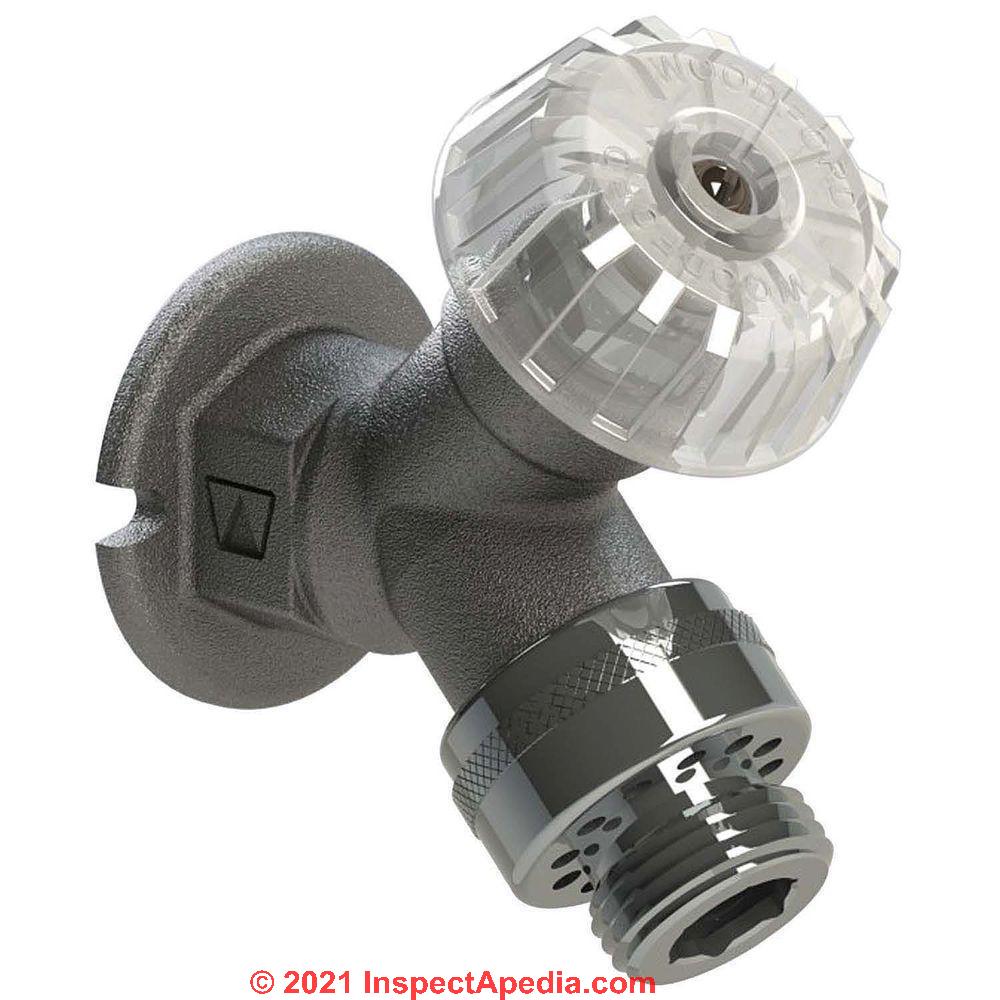 I have a exterior faucet similar to the image attached, [photo above] and I have no idea what it is.
I have a exterior faucet similar to the image attached, [photo above] and I have no idea what it is.
In particular, the purpose of the holes surrounding the threaded part.
Obviously, when I attach a regular hose, water comes pouring out from around the hose from these holes.
So is there a special hose attachment I should know about? Thanks in advance - On 2020-05-14 by Pinetop
Reply by (mod) -
Pine
Thank you for the interesting question and outdoor faucet photo.
In your photo that's a Woodford Model 24 anti-siphon hose bibb or outdoor faucet.
That perforated fitting is a vacuum breaker - that's the anti-siphon feature. This hose bibb is for use only in non-freezing climates.Those perforations are there to allow air into the faucet body when needed to prevent siphoning by the hose.
The connector should not be leaking but might if the female hose connector your are attaching is not deep enough or does not have a washer of sufficient diameter and thickness.
You can read the product specs athttps://inspectapedia.com/plumbing/Anti-Siphon-Hose-Connector-Woodford-Model-24.pdf
and if you're having trouble with your anti-siphon faucet you can contact the company for help:
WOODFORD MANUFACTURING COMPANY
2121 WAYNOKA ROAD COLORADO SPRINGS, CO 80915 USA
Phone (800) 621-6032 Fax (800) 765-4115
Website: www.woodfordmfg.com
Email: sales@woodfordmfg.comFollowup by Pinetop
Thank you so much for the quick and detailed reply, this all makes sense to me now.
However, I have several hoses, and none of the female connectors are long enough to reach the perforated fitting, so is there some sort of connector or adapter available that will prevent leaking?
Reply by (mod) -
I would remove the adapter-it simply unscrews from the faucet.
Take the part to your hardware ir garden supply store to find a deep adapter.
Outdoor faucet leaks from the handle when it's on.
My outdoor faucet leaks from the handle when it's on. I can loosen the packing nut but I can not seem to budge the nut on the handle in order to get to the packing washer (I also tried to loosen the stem screw with no luck and stripped that screw).
Can I replace the entire stem assembly or will it be too difficult to match with my existing spigot and I need to replace the whole faucet? On 2020-05-11 by Paul
Reply by (mod) -
Depending on the brand, model, and age of your faucet it may be possible to replace the stem assembly. On older homes I have generally not had good luck with that approach and I've instead replaced the entire faucet.
Or you may be able to simply replace the stem packing or dome packing -see the repair procedure at
REPLACE FAUCET VALVE STEM BONNET PACKING - to fix leaks around the valve stem, replace the dome packing
Why does sillcock not stop when the handle is turned off?
Why does my evaporative cooler sill cock not stop the water when handle is turned to off? - On 2019-08-27 by Anonymous
Reply by (mod) -
I'm not sure, Anon, since a "sill cock" or "hose bibb" as discussed on this page are used as an outdoor spigot or garden hose connection and are normally connected to the building cold water supply piping, while the drain valve on an evaporative cooler is not and should not be used for normal outdoor watering.
That valve is there to permit draining the evaporative cooler as part of cleaning and maintenance.
The exact reason that ANY water shutoff valve is leaking can vary but the most common causes are
- a lost or damaged stop washer inside the valve if it's a stop valve
- a leaky valve stem washer that can sometimes be fixed by tightening the bell nut or cap nut on the stop valve or sillcock
- corrosion of valve internal parts
- (rarely) other mechanical damage to the valve
- (not likely to pertain to your stop valve but likely on anti-siphon outdoor faucets) a damaged or leaky anti-siphon valve on the sillcock
Perhaps if you attach a photo of your evaporative cooler and in a second comment a photo close-up of your valve I can see the valve type and can offer more specific advice.
Are all sill cocks/hose bibs contaminated with lead?
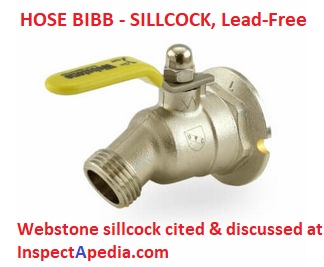 Are all sill cocks/hose bibs contaminated with lead? - On 2018-07-16 by Roy
Are all sill cocks/hose bibs contaminated with lead? - On 2018-07-16 by Roy
Reply by (mod) - where to get a lead-free sillcock or hose bibb
No, Roy, there are some models of sillcocks or hose bibs that use stainless steel or other materials and that are specifically promoted as "lead free".
Also not all brass must contain lead.
Raven makes stainless steel sillcocks
Other brands advertising lead free sillcocks include
Matco-Norca
Proline
Watts
Webstone
and surely there other manufacturers, varying by country.
Shown below is a nickel-plated brass lead free sillcock from Webstone.Watch out: Many conventional garden hoses use lead-containing materials in the hose body, not just its connector fittings. So never use such a hose for moving potable or drinking water.
...
Continue reading at FAUCET, OUTDOOR HOSE BIBB LEAK REPAIR or select a topic from the closely-related articles below, or see the complete ARTICLE INDEX.
Or see FAUCETS, OUTDOOR HOSE BIBB REPAIR FAQs - questions & answers posted originally on this page.
Or see these
Recommended Articles
- EMERGENCY WATER SHUTOFF VALVE - how to stop water flow to permit plumbing repairs if there's no working shutoff valve
- FAUCETS & CONTROLS, KITCHEN & BATH
- FAUCETS, OUTDOOR HOSE BIBBS - home
- FAUCET, OUTDOOR HOSE BIBB LEAK REPAIR - traditional hose faucet leak repairs
- FAUCET, SILLCOCK ANTI SIPHON LEAK REPAIR - frostproof / anit-siphon Woodford type outdoor faucet leak repairs
- PLUMBING CONTROLS & VALVES - photos and descriptions of all types of plumbing valves.
- WATER SHUTOFF VALVE LOCATION - turn off water supply before trying to repair the faucet
Suggested citation for this web page
FAUCETS, HOSE BIBBS & OUTDOOR PLUMBING at InspectApedia.com - online encyclopedia of building & environmental inspection, testing, diagnosis, repair, & problem prevention advice.
Or see this
INDEX to RELATED ARTICLES: ARTICLE INDEX to PLUMBING VALVES
Or use the SEARCH BOX found below to Ask a Question or Search InspectApedia
Ask a Question or Search InspectApedia
Try the search box just below, or if you prefer, post a question or comment in the Comments box below and we will respond promptly.
Search the InspectApedia website
Note: appearance of your Comment below may be delayed: if your comment contains an image, photograph, web link, or text that looks to the software as if it might be a web link, your posting will appear after it has been approved by a moderator. Apologies for the delay.
Only one image can be added per comment but you can post as many comments, and therefore images, as you like.
You will not receive a notification when a response to your question has been posted.
Please bookmark this page to make it easy for you to check back for our response.
IF above you see "Comment Form is loading comments..." then COMMENT BOX - countable.ca / bawkbox.com IS NOT WORKING.
In any case you are welcome to send an email directly to us at InspectApedia.com at editor@inspectApedia.com
We'll reply to you directly. Please help us help you by noting, in your email, the URL of the InspectApedia page where you wanted to comment.
Citations & References
In addition to any citations in the article above, a full list is available on request.
- [10] "Anti-Burst Freezeless Wall Faucet Model 16 & 19, Installation Instructions", Woodford Manufacturing Company, 2121 Waynoka Road, Colorado Springs, Colorado 80915, Phone: (800) 621-6032, Website: woodfordmfg.com, Email: sales@woodfordmfg.com, WCM Industries, Inc., web search 5/12/12, original source:
http://www.wcmind.com/woodford/Installation/16-19%20Installation%20Instructions.pdf - Hose bibb synonyms: sill cock, sillcock, hose faucet, outdoor wall faucet, frost-proof faucet, freeze-proof faucet, freezeless wall faucet, hose bib, sill cock, hose hook-up.
- In addition to citations & references found in this article, see the research citations given at the end of the related articles found at our suggested
CONTINUE READING or RECOMMENDED ARTICLES.
- Carson, Dunlop & Associates Ltd., 120 Carlton Street Suite 407, Toronto ON M5A 4K2. Tel: (416) 964-9415 1-800-268-7070 Email: info@carsondunlop.com. Alan Carson is a past president of ASHI, the American Society of Home Inspectors.
Thanks to Alan Carson and Bob Dunlop, for permission for InspectAPedia to use text excerpts from The HOME REFERENCE BOOK - the Encyclopedia of Homes and to use illustrations from The ILLUSTRATED HOME .
Carson Dunlop Associates provides extensive home inspection education and report writing material. In gratitude we provide links to tsome Carson Dunlop Associates products and services.


